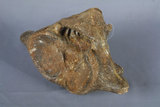中文名:苑裡偽虎鯨
學名:Pseudorca yuanliensis Chang & Cheng 1998
推薦分享
後設資料
- 資料識別:
- 系統識別碼:0b00000180235411
- 資料類型:
- 型式:合集
- 紀錄類別:脊椎動物化石知識單元
- 主題與關鍵字:
- 學域-大分類:地質-化石類
- 分類:脊椎動物化石
- 拉丁界名:Animalia
- 中文界名:動物界
- 拉丁門名:Chordata
- 中文門名:脊索動物門
- 拉丁亞門名:Vertebrata
- 拉丁總綱名:Tetrapoda
- 中文總綱名:四足類總類
- 拉丁綱名:Mammalia
- 中文綱名:哺乳綱
- 拉丁亞綱名:Eutheria
- 中文亞綱名:真獸亞綱
- 拉丁目名:Cetacea
- 中文目名:鯨目
- 拉丁亞目名:Odontoceti
- 中文亞目名:齒鯨亞目
- 描述:
- 簡介:"Elephant birdIntroductionThe modern false killer whales, while not commonly seen, are widely distributed in the warm, deep waters of tropical and subtropical regions, such as the Mediterranean Sea and the Red Sea . The False Killer whale is a small sized and slender whale, its skull extends into an obtuse, bluntly-tipped beak. It has 8 to 11 pairs of teeth. In 1997, construction workers unearthed some fossil specimens in the mountain regions of Yuanli, Miaoli County . Researcher from the NMNS excavated and identified them to be fossil remains of a type of whale. Analysis of rock strata from the excavation sites has concluded it to be the Pleistocene Toukeshan Stratum, which was about 1 to 2 million years ago. Clues from the cranial shape, structural ratio and teeth morphology suggested that these animals have more elongated beaks and may resemble the modern day False Killer Whales, unlike the more obtusely beaked modern day orcas. However, these remains are larger than modern day false killer whales, and together with their dating back to at least a million years, these animals are believed to be an unrecorded new species. They were tentatively named Pseudorca yuanliensi and belong to the genus Pseudoorca of the Delphinidae family. Detailed study on this species is currently underway.現生的偽虎鯨一般並不常見,但分佈相當廣泛,主要出沒在熱帶與亞熱帶附近的溫暖深水海域中,包括地中海及紅海等海域。偽虎鯨是一種體型小且修長的鯨魚,其頭部修長漸縮成圓鈍的嘴喙,有著8至11對的牙齒。 在民國八十六年時,有挖土的工人在苗栗苑裡山區意外發現一些化石,經本館研究人員挖掘與鑑定之後,確認為是一種鯨類的化石。從化石出土地點的岩層狀況,研判該地層為更新世頭嵙山層,距今約一、二百萬年。根據頭骨的形狀和構造比例,以及牙齒型態的分析,其頭骨吻部較為細長,應與現生的偽虎鯨為同一類群,有別於吻部較鈍短,但整個頭骨更大的虎鯨。然而該化石偽虎鯨的各部位尺寸均大於現生的偽虎鯨,再加上該化石種年代超過了一百萬年,因此相信該化石為一未記錄之新種,暫時命名為苑裡偽虎鯨,屬於海豚科,偽虎鯨屬,詳細的研究此刻也正進行中。"
- 出版者:
- 數位化執行單位:國立自然科學博物館:地質學組脊椎動物化石學
- 管理權:
- 典藏單位:國立自然科學博物館
- 使用聲明:館內公開瀏覽
授權聯絡窗口
- 鍾舜丞
04-23226940*762
chungnmns@nmns.edu.tw



